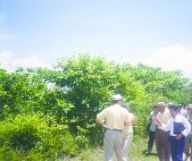The Tropical Dry Forest of Coronado:Part Two: Learning About This Treasure

Translation by Word for Word providing translations and language classes to this community (6786-0854). ************************************************************************************************ The Smithsonian study of the tropical dry forest of Coronado found that it is a young dry forest with great marine influences. Its trees are less than 10 meters tall and shed their leaves in dry season. The initial species list included 29 families with 51 species of plants, 35 species of trees, 7 species of bushes, 9 species of wild grass and rattan and various orchids. In order to fully appreciate the tropical dry forest of Coronado, it is important to understand the characteristics that make it a unique ecosystem. These include:
- Pluvial precipitation of a minimal 1.1 millimeters per year.
- An annual average biotemperature of only 21.4 degrees C (70.52 degrees F).
- An altitude of 24 to 30 meters above sea level.
- An evotranspiration level of 1.22 (on a scale of 1-5)
- A Föenh Phenomenon, in which the temperature rises daily to more than 30 degrees C (80 degrees F) for a couple of hours and then drops abruptly.
- Dry seasons that last 5 to 6 months.
- Soil that is brown with pH levels of 6.5 to 7.5 and is high in phosphorus and abundant in potassium, calcium and magnesium.
- Very few mammals, but home to a variety of insects, reptiles and birds that are adapted to the conditions of this ecosystem. Snakes play a large part in controlling rodents and are prey for birds; however, they are not harmful to humans because they are nocturnal and only strike when provoked.
Flora
| Common Name (English equivalents where available) | Scientific Name |
| Aceituno (olive) | Agonandra brasiliesis |
| arbol carne | Roupala montana |
| cagajon | Zuelania quidona |
| canelito | Ardisia revolute |
| canotillo | Piper sp |
| espino amarillo (yellow hawthorn) | Chomelia spinoza |
| guácimo pacheco | Luchea speciosas |
| guácimo | Guazuma ulmifolia |
| jagua | Genipa Americana |
| madroño | Alibertia Edulis |
| matillo | Mataba glaberrima |
| nance | Byrsonia crassifolia |
| negra jorra | Alibertia garapática |
| níspero | Mamilkara zapota |
| peine de mono | Apeib tirbouru |
| semana santa | Rodriquecia secunta |
| tuliviejo | Jacquinia macrocarpa |
| uvero | Cocoloba lasseri |
| Vainilla (vanilla) | Vanilla planifolia |
| chumico | Curatela americana |
Fauna
| Common Name (English equivalents where available) | Scientific Name |
| armadillo comun | Dasypus novemcintus |
| armadillo | Cabassous centralis |
| azulejo | Dachis cayan ultramarina |
| borriguero | Ameva quadriline |
| capacho | Caprimulgos saturates |
| carpintero coronirrojo | Melanerpes rubricapilus waleri |
| chango | Caxides mexicanus |
| Crocodylus | Crocodylus acutus |
| falsa coral | Erythrolamprus minus |
| gallinazo cabecirrobo | Cathartes ara |
| garza bueyera (heron) | Bubulcs ibis |
| gato maglatero | Procyon lotor |
| gavilan cangrejero (sparrow hawk) | Buteogallus anthracinus |
| iguana verde (green iguana) | Iguana iguana |
| perezoso dos dedos (two-toed sloth) | Choloe pus hoffmani |
| ratón arrocero (rice mouse) | Dryzomis capito |
| tijereta sabanera | Tyrannus savanna monch |
| tortolita común | Columbina passeira |
| venado colablanca (white-tail deer) | Masama americana |
